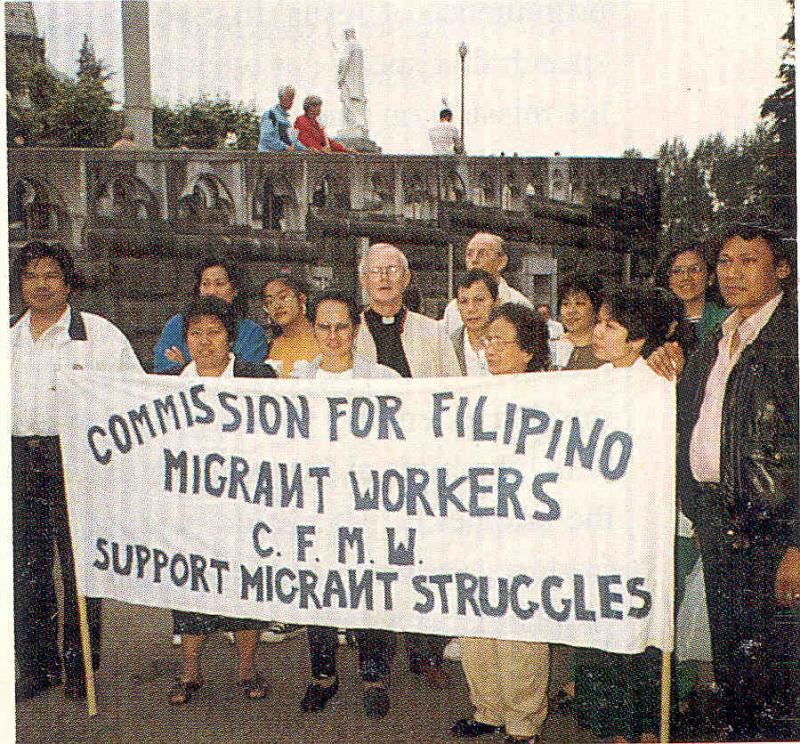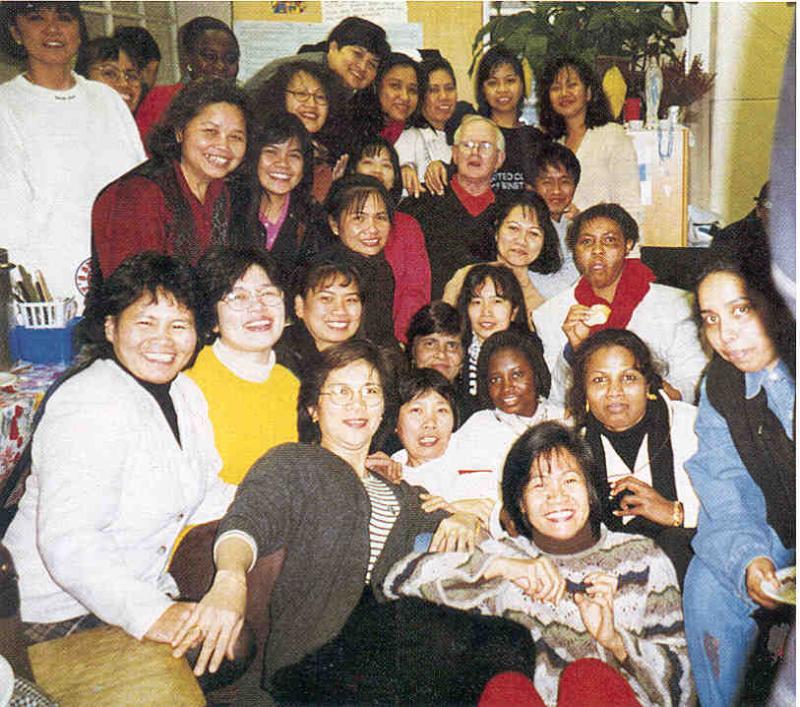The Runaway Slaves
By Fr. Aodh O’Halpin, MSSC
Fr. Aodh O’Halpin, Columban chaplain to migrants in London, describes for us the kinds of things that happen in the lives of domestic workers. He has worked in London since the early 1980’s after having been in Mindanao for more than 20 years

“I now know that princesses, diplomats, doctors of medicine and other normally respectable people keep bonded, indentured domestics in virtual slavery and all too often their misdeeds go unchecked....Domestics from overseas, nearly all working for foreign employers and mostly in London and the home counties, remain wide open to exploitation.” Harsh words but they came from none other than Lord Hylton in the foreword to Bridget Anderson’s books Britain Secret Slaves.
About Domestic Slavery
Bridget Anderson’s book looks at the causes of migration, the sad situation of many Asian domestic workers in the Gulf States, particularly post-Liberation Kuwait and the problem of domestic slavery in Britain. There are many personal accounts of the indignities suffered by defenseless women. A number of organizations in Britain are concerned about the situation of overseas domestic workers who come to Britain with their employers.
For many years Columban priests and sisters have worked alongside others on the Commission for Filipino Migrant Workers (CFMW). Since 1987 I have also been associated with Kalayaan, an organization based in London which concerns itself with the needs of domestic workers of all nationalities.
Deprived Rights
There are many domestic workers in Britain who arrived classified as members of the household o f people from other countries. As a general rule domestic workers accompanying their employers are admitted into Britain. Outside the household of their employers they have no rights. Among them are women who suffer all kinds of mistreatment and run away from their employer as soon as the opportunity arises. They then become illegal immigrants as the terms of their entry to Britain does not allow them to change employment.
The Survey
A survey carried by CFMW/ Kalayaan among 666 overseas workers who ran away reveals the reasons:
Psychological abuse – 91.9%
Physical abuse - 33.6%
Sexual abuse – 6.3%
No regular food - 62.3%
Not paid regularly – 81%
No time off – 95%
Not having a bed – 51%
Their average working day was 17.5 hours and average monthly salary $180. If one takes the descriptions of slavery as give in 20th century human rights charters them the situation of many of these workers is one of slavery or virtual slavery.
Lisa’s Case
Lisa was a typical case of one of these who arrived at our center. Four months previously she had arrived in Britain. She had never been allowed outside the house for her employer. Her spirit was broken from continual abuse, insults and beatings by her employer. Finally, she ran away one day when the door was left open. She knew nobody in London. She just kept running until she saw a Filipino at a bus stop who talked to her and took her to the center. Over the past ten years over 4, 000 women in situations similar to that of Lisa have come to our centre.
Refuge Center
The police and local authorities have referred people in difficulties to us. The center provides as safe haven and it is a place where people can talk freely make friends and often begin new life and a new job. Over the past year the centre has responded to 8,000 requests by phone or visit for help for the migrant community. There is average of 20 visitors a day to the center and on Sunday there may be as many as 80.
Organization’s Domestic Worker
Classes and weekend courses are a regular feature of life at the center in London’s Notting Hill where accommodation is shared by Kalayaan and CFMW and the Brent Asian Women’s Centre. There are other courses on computer use, dressmaking, hairdressing, music and cultural programs, human development, with special attention to women’s issues since most of those who come are women. Retreats and opportunities for spiritual growth are also offered. Domestic workers now have a strong and active organization of over 600 members.
The CFMW with which I am principally involved has many other aspects to its work such as helping people to settle in and adjust, visits to hospitals and searches for missing persons. A housing association has been set up to attend to the needs of the homeless in the Filipino Community.

Support from People
Our efforts to improve the situation of people like Lisa have received support from many people. Lord Hylton and a number of MPs have promoted the cause in Parliament. A large number of domestic workers are members of the Transport and General Workers Union (TGWU), and this union has been supportive. The late Cardinal Hume helped on many occasions.
Gathered Pieces
Fro those of us who work with migrants at the Kalayaan Centre the going can be heavy at times but there is plenty of joy and laughter. There is a great satisfaction especially seeing happiness come again into the lives of those who were broken and terrified when they first arrived on our doorstep.
Finally, she ran away one day when the door was left open. She knew nobody in London. She just kept running until she saw a Filipino at a bus stop who talked to her and took her to the centre.
